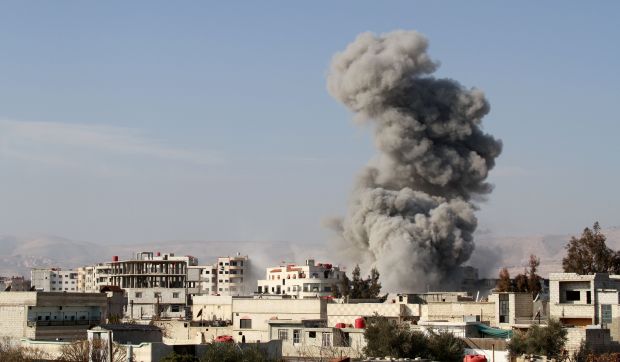
Smoke is seen rising from buildings following alleged bombings by regime forces on the city of Dera’a, southwest of the capital Damascus, on January 11, 2014. (AFP/Fadi Dirani)
London, Asharq Al-Awsat—Syrian Deputy Foreign Minister Faisal Al-Mekdad claimed that western intelligence agencies visited Damascus to discuss security cooperation with the Assad government.
In an interview with the BBC on Wednesday he said: “I will not specify (which countries), but many of them have visited Damascus,” he said, adding:”Many of these countries have contacted us to coordinate security measures.”
Mekdad said that there was a schism between Western security officials concerned about the growing threat of Islamic extremism in the country, and politicians who are pressuring the embattled Syrian president to step down from power following a more-than-three-year conflict.
The Wall Street Journal appeared to confirm Mekdad’s claims, reporting that European intelligence agencies had secretly met with delegates of Syrian President Bashar Al-Assad to share information on European extremists operating in Syria. Wednesday’s report, quoting unnamed Western and Middle Eastern officials, claimed that the meetings aimed to gather information on no fewer than 1,200 European jihadists who have joined militant groups in Syria amid concerns that these citizens could pose a threat to national security when they return home.
The sources claimed that British, German, French, and Spanish intelligence agencies had been in contact with Assad regime officials in Damascus, but denied that any US intelligence agencies were involved in the talks.
The Western and Middle Eastern officials and diplomats also stressed that the talks were narrowly focused on the extremists and Al-Qaeda’s growing presence in Syria, denying that this represented a broader diplomatic opening with the embattled Assad regime.
The West is increasingly concerned about the specter of Al-Qaeda and Islamic extremism in Syria, particularly following the increasing presence of the Islamic State of Iraq and Syria (ISIS) and the Al-Nusra Front. ISIS has recently expanded its operations into neighboring Iraq, prompting an international outcry.
“Frankly speaking the spirit has changed,” Mekdad said in reference to the increased threat represented by Islamic extremism in Syria.
“When these countries ask us for security cooperation, then it seems to me there is a schism between the political and security leaderships,” he added.
The Syrian opposition has expressed concern about the talks, particularly following Assad’s claims that his stepping down would only serve to strengthen the presence of Islamic radicals.
A Syrian opposition member in Istanbul told The Wall Street Journal: “We worry that these preliminary discussions could lead to broader cooperation”
With the internationally backed Geneva II peace conference set to begin on January 22, the main opposition Syrian National Coalition has yet to announce whether it will attend or not. The Coalition is set to make its final decision on Friday.
